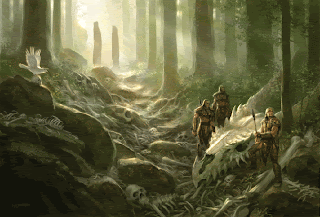After finishing "
The Bonehunters
" and starting with "
Reaper's Gale
", I have came up to two realizations. First, I haven't read those two books enough times. (this is probably true for "
Toll the Hounds
"). I know this because I am constantly coming across details I forgot or even didn't know at all. I expected that I will find some unknown facts or that I will see something in another light, considering that I have read almost whole series now, but I didn't expect such amount of that. I was sure that I have read these two books at least three times, but I am not so sure now. Second, all this rereading is starting to take its toll. I am not enjoying these book as much I should; at least partly, my objective changed from "rereading and enjoying" to "just finishing these damned book". Definitely, after finishing the series (I expect this to be in 6-8 weeks, considering that I need almost two weeks per book) I will have to take some rest from reading. I will watch some anime or something. On the other hand, my reading pile has never been larger: "
The Crippled God
", "
Empire in Black and Gold
" and "
The Way of Kings
". Wow. Soon there will be fourth book.
Now, to the book. After "
House of Chains
" and "
Midnight Tides
", whom I referred to as transitional books, we have arrived to Erikson a bit different that the first books. It is still everything that marked this series: complexity, style, characters... But everything is taken to extreme and over. This is most evident if first portion of book: (literary) every sub-chapter (I am referring to parts of chapter where we follow one point of view) is crazy. Hilarious, sarcastic, unbelieving, confusing, extreme in every way: crazy! Consider just first such sub-chapter: Iskaral Pust's audience with Shadowthrone. I can't begin to imagine what some casual reader, someone unknowing of MBotF, would think about it... And I said, this takes a good part of the book. In later stages, this extremity is a bit diluted, but still present.
"
The Bonehunters
" is one of my favorite books in series. First, we are back to Seven Cities, and as I said, I adore the long history of it. Second, there is a bunch of my favorite characters here: Fiddler, Iskaral Pust, Kalam, Quick Ben, Malazan marines, Grub... Third, we have three culminations in this book: Y'Ghatan, G'Danisban and Malaz City. Fourth: each of those culminations, and especially the last one.
There are many plot-lines in this book, but lets' just consider a few important ones. Malazan 14th army is represented very well in the book, with several POVs. It can probably be said that this army is the main element of "
The Bonehunters
". It also have to be mention the existence of the monster-chapter, somewhere around the middle. It depicts the battle and aftermath of Y'Ghatan and it is long as several normal chapters. And also one of the best. The ending in Malaz City is also one of the most bitter one in the series, right behind the one of "
Deadhouse Gates
", near Aren (not counting the one in "
Dust of Dreams
", since I still don't know the consequences of it). Paran's plot is a good one, although he became a bit too-powerful character, so the outcome of his battles is always expected. Karsa's plot is a very interesting, especially the way it is viewed from Samar Dev's perspective (and she is also one great character).
The only POV I am not very satisfied with is Crokus'. First part of the their travels is OK, although with not much impact. But the event's toward the end of the book, encompassing "the green fall", are very confusing. I read this part at least three times and I consider myself well versed in MBotF, but this event still present total mystery. OK, I know what happened, although not very exactly, but the meaning of it is totally out of my range of reasoning.
But, except this little flaw, this book is a brilliant gem in
Malazan Book of the Fallen series. For all fans that stick with the series, this book will be a great addition.



